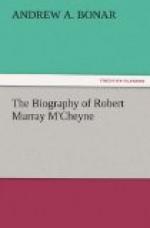of El Arish, the last town on the Egyptian frontier.
31.—We spent in El Arish, being unable
to get fresh camels. We bought a sheep for five
shillings; drank freely of their delightful water,—what
a blessing after the desert! Found out the
river of Egypt, the boundary of Judah mentioned
in the Bible, quite dry. June 1.—Visited
the school,—a curiosity: all the children
sit cross-legged on the floor, rocking to and fro,
repeating something in Arabic. We had a curious
interview with the governor, sitting in the gate
in the ancient manner. We are quite expert
now at taking off our shoes and sitting in the Eastern
mode. Smoking, and coffee in very small cups,
are the constant accompaniments of these visits.
Left the same evening, and did not reach Sheikh
Juidhe, in the land of the Philistines, till the sun
was nearly bursting into view. 2.—Spent
a happy Sabbath here; sung ‘In Judah’s
land God is well known.’ Singing praises
in our tents is very sweet, they are so frail, like
our mortal bodies; they rise easily into the ears
of our present Father. Our journey through
the land of the Philistines was truly pleasant. 3.—We
went through a fine pasture country; immense straths;
flocks of sheep and goats, and asses and camels,
often came in sight. This is the very way
up out of Egypt, little changed from the day that
the Ethiopian went on his way rejoicing, and Joseph
and Mary carried down the babe from the anger of
Herod. Little changed, did I say? it is all
changed; no more is there one brook of water.
Every river of Egypt,—Wady Gaza, Eshcol,
Sorek,—every brook we crossed, was dried
up; not a drop of water. The land is changed;
no more is it the rich land of Philistia. The
sand struggles with the grass for mastery.
The cities are changed,—where are they?
The people are changed: no more the bold Philistines,—no
more the children of Simeon,—no more Isaac
and his herdsmen,—no more David and his
horsemen; but miserable Arab shepherds,—simple
people, without ideas,—poor degraded, fearful.
Khanounes was the first town we entered: Scripture
name unknown. The burying-ground outside the
town. The well, and people coming to draw,
were objects of great interest to us. The people
were highly entertained with us in return. We
sat down in the bazaar, and were a spectacle to
all. How much we longed to have the Arabic
tongue, that we might preach the unsearchable riches
of Christ in God’s own land! Same evening
we heard the cry of the wolf, and encamped two
miles from Gaza. The plague was raging, so
we did not enter, but spent a delightful day in comparing
its condition with God’s word concerning it:
’Baldness is come upon Gaza.’
The old city is buried under sand-hills, without
a blade of grass, so that it is bald indeed. The
herds and flocks are innumerable, fulfilling Zeph.
2; Andrew and I climbed the hill up which Samson
carried the gates. 5.—Passed through
a fine olive grove for many miles, and entered the
vale of Eshcol. The people were all in the




